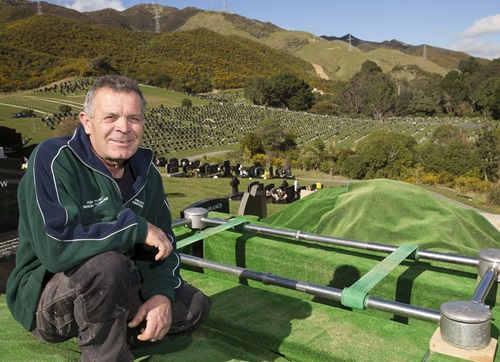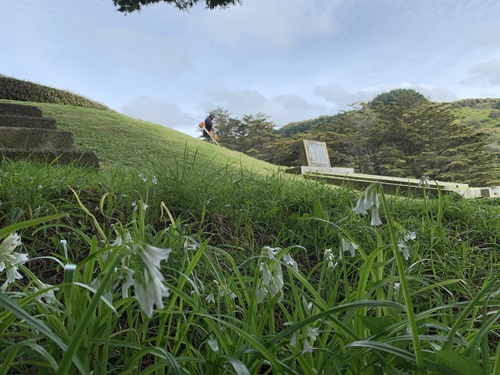It’s the privilege they feel to be part of a process that brings closure for whānau, and the honour of being a guardian over a loved one’s final resting place.
Marcello and Ken are Senior Cemetery Technicians working for Wellington City Council, overseeing the Karori and Makara cemeteries respectively. Originally a chef from Italy, Marcello has been in the job for only two years but is already leading a team of his own, and it is clear he takes tremendous pride in what he does.
“I like to think about our job as the last step in a painful process – when we can give the family a piece of relief,” he says. “Once they leave us at the cemetery and we have done the burial, the family can start to grieve by themselves.
“Before this, there is the process of dealing with losing someone you love, dealing with the funeral director, making funeral arrangements, picking out the casket – all this stuff is stressful in a moment that is already hard. So when they come to us, we can put an end to this and they can then start to process their loss in a different way.”
For Ken, it’s being a listening ear to the people he meets and the stories they share that has kept him in the job for a solid 44 years.
He started work as a gravedigger in Karori Cemetery in 1976, when he was just a teenager. Back then all the graves were hand dug by shovel, seven feet deep. Now he uses a digger when space permits.
“I do enjoy the job. I’m sure I wouldn’t have done it for this long if I didn’t like it,” he says. “The best part is probably when the family come back and you can help answer their questions, give them some comfort.

“They might say, ‘We were married so many years and we did this and that together’, so you listen to all these stories. Sometimes they’re alone and they have no one to talk to so they’ll come over and tell you about the grave they are visiting.”
As well as preparing gravesites and conducting burials in all seasons and all weather, Marcello, Ken and their teams carry out cremations and ash interments. They also keep the grounds of the cemeteries neat and tidy, mowing the lawns, trimming trees, and putting down fresh grass seed once burials have taken place.
“Most of our job in Karori is ground maintenance,” explains Marcello. “It’s a big cemetery with more than 40 acres. It’s busy, full of people with dogs and bikes, running and jogging, so we try and keep the cemetery in order for the public – keep it so it’s safe and clean.”
In 2019, the small cemeteries field team of six carried out 350 cremations and more than 400 burials. Marcello says different cultures and religions have different protocols when it comes to funeral services and memorials, and the team must be aware of these to ensure respect is always shown.
When the Covid-19 Alert Level 4 lockdown was announced, the team had to re-think the way they did their job so they could continue to provide their important services. As Marcello says, “It’s a job that can’t stop – the city needs us to be able to do the job”.
Not knowing what to expect as a result of the pandemic, the team geared up for a worst-case scenario after seeing how things were playing out around the world, including in Marcello’s home city of Rome.
“Before the lockdown we spent a lot of time preparing and thinking about how we could do the job safely. We spent a lot of time being ready for an emergency. Fortunately that didn’t happen, but the important point is we were ready for that possibility.”

Joining Marcello and Ken in the field are Leslie Blackwell, Christopher Scott, Dylan Brown, and Timothy Silvester, while Lee Banks works in the office.
Cemeteries Manager Elizabeth Reddington says despite the challenges of the lockdown, her team worked hard introducing processes to keep everyone safe, while taking great pride in their work and providing the best possible customer experience.
“There is no part of our operation that hasn’t been adjusted to ensure the safety of families, funeral directors and our team at the cemetery – from booking the service, to preparing burial plots and preparing for cremations with no chapel services or witness of cremation.
“I’m proud of the way our team have worked together to provide a caring service to families while working within the current restrictions. To see the impact of the restrictions on families is difficult but the team use their experience to do their best for the families.”
Marcello says he wouldn’t want to be working anywhere else but in Karori Cemetery, where he is surrounded by birds, tress, and history. “I really like this job because I like the idea that I can be useful – it is a worthwhile job. I go home and I think, I did something good for someone.”
* During Alert Level 3, the gates will remain closed at Makara and Karori cemeteries, with pedestrian-only access at entrances. The Karori Cemetery office is closed to the public. Chapels are open for services with up to 10 people with appropriate distancing and cleaning measures in place. More information about Wellington City Council cemeteries is available on our website: https://wellington.govt.nz/services/community-and-culture/cemeteries